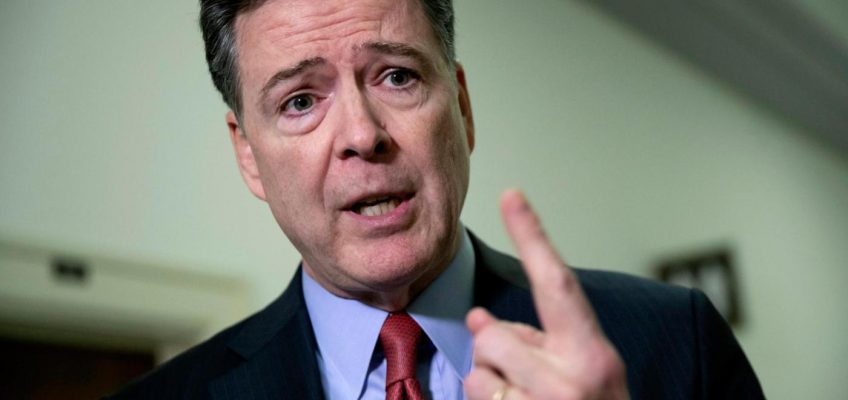By ERIC TUCKER and ALANNA DURKIN RICHER
WASHINGTON (AP) — Lawyers for former FBI Director James Comey urged a judge Monday to dismiss the case against him, calling it a vindictive prosecution motivated by “personal animus” and orchestrated by a White House determined to seek retribution against a perceived foe of President Donald Trump.
Related Articles
United States and Australia sign critical-minerals agreement as a way to counter China
Government shutdown imperils dozens of Head Start preschool programs
Appellate judges question moves to keep Alina Habba in place as top New Jersey prosecutor
US envoys arrive in Israel to shore up the Gaza truce after violence flares
How military’s ‘safe’ plan to fire munitions over Interstate 5 in California went off the rails
The lawyers separately called for the indictment’s dismissal because of what they said was the illegitimate appointment of the U.S. attorney who filed the case days after being hastily named to the job by Trump.
The two-prong attack on the indictment, which accuses Comey of lying to Congress five years ago, represents the opening salvo in what is expected to be a protracted court fight ahead of a trial currently set for Jan. 5. The motions take aim not at the substance of the allegations but rather on the unusual circumstances of the prosecution, which included Trump exhorting his attorney general to bring charges against Comey as well as his administration’s abrupt installation of a White House aide to serve as top prosecutor of the elite office overseeing the case.
“Bedrock principles of due process and equal protection have long ensured that government officials may not use courts to punish and imprison their perceived personal and political enemies,” wrote Comey’s defense team, which includes Patrick Fitzgerald, the former U.S. Attorney in Chicago and a longtime Comey friend. “But that is exactly what happened here.”
They said the Justice Department had brought the case because of Trump’s hatred of Comey, who as FBI director in the first months of Trump’s first term infuriated the president through his oversight of an investigation into potential ties between Russia and Trump’s 2016 campaign. Trump fired Comey in May 2017. The two have been open adversaries in the years since, with Comey labeling Trump “unethical” and comparing him to a mafia boss and Trump branding Comey an “untruthful slimeball” and calling for him to be punished because of the Russia investigation.
“The government has singled out Mr. Comey for prosecution because of his protected speech and because of President Trump’s personal animus toward Mr. Comey,” defense lawyers wrote, adding that such a “vindictive and selection prosecution” violates multiple provisions of the Constitution and must be dismissed.
Comey’s defense team had foreshadowed the arguments during his first and only court appearance in the case, where he pleaded not guilty.
Though motions alleging vindictive prosecutions do not often succeed, this one lays out a timeline of events intended to link Trump’s demands for a prosecution with the Justice Department’s scramble to secure an indictment last month just before the statute of limitations was set to lapse.
Last month, for instance, he complained in a Truth Social post directed to Attorney General Pam Bondi that “nothing is being done” on investigations into some of his foes and called for action, specifically referencing inquiries into Comey, New York Attorney General Letitia James and Democratic Sen. Adam Schiff of California.
“JUSTICE MUST BE SERVED, NOW!!!” part of the message said.
He installed Lindsey Halligan, a White House aide who had been one of Trump’s personal lawyers but had no experience as a federal prosecutor, to run the Eastern District of Virginia and replace Erik Siebert, who had resigned as U.S. attorney one day earlier amid administration pressure to charge Comey and James. Comey was indicted days later.
Comey’s lawyers argued that that social media post represented an admission that the government was prosecuting Comey for “an impermissible discriminatory purpose.”
“For many years, President Trump has sought to prosecute or otherwise punish Mr. Comey because of overt hostility to Mr. Comey’s protected speech and because of his personal bias against Mr. Comey,” the attorneys said. “But despite President Trump’s yearslong campaign to prosecute Mr. Comey, no career or appointed prosecutor had ever agreed to do so. Thus, Mr. Trump made clear to his Attorney General that the only way to achieve ‘JUSTICE’ against Mr. Comey was by ousting Mr. Siebert and installing Ms. Halligan.”
Defense lawyers in a separate motion argued that the case was “fatally flawed” because Halligan was unlawfully appointed before she signed the indictment late last month.
“The President and Attorney General appointed the President’s personal lawyer as interim U.S. Attorney in violation of a clear statutory command so that the interim U.S. Attorney could indict an outspoken critic of the President just days before the relevant statute of limitations was set to expire,” defense lawyers said.
That motion is expected to be heard by a different judge than the trial judge, U.S. District Court Michael Nachmanoff.
Halligan is not the only U.S. attorney facing a court challenge.
A federal appeals court in Philadelphia heard arguments Monday in a case challenging the tenure of Alina Habba as New Jersey’s top federal prosecutor. A panel of judges did not immediately rule but questioned the propriety of maneuvers meant to keep Habba in her job.
Separately Monday, defense lawyers and prosecutors argued in court papers over a suggestion by the Justice Department that Fitzgerald, might have to step aside. Prosecutors late Sunday asserted in a court filing that Comey’s “lead defense counsel” had earlier been used by Comey to disclose classified information, a claim the defense team called “provably false” and defamatory.
Associated Press writer Mike Catalini in Philadelphia contributed.




